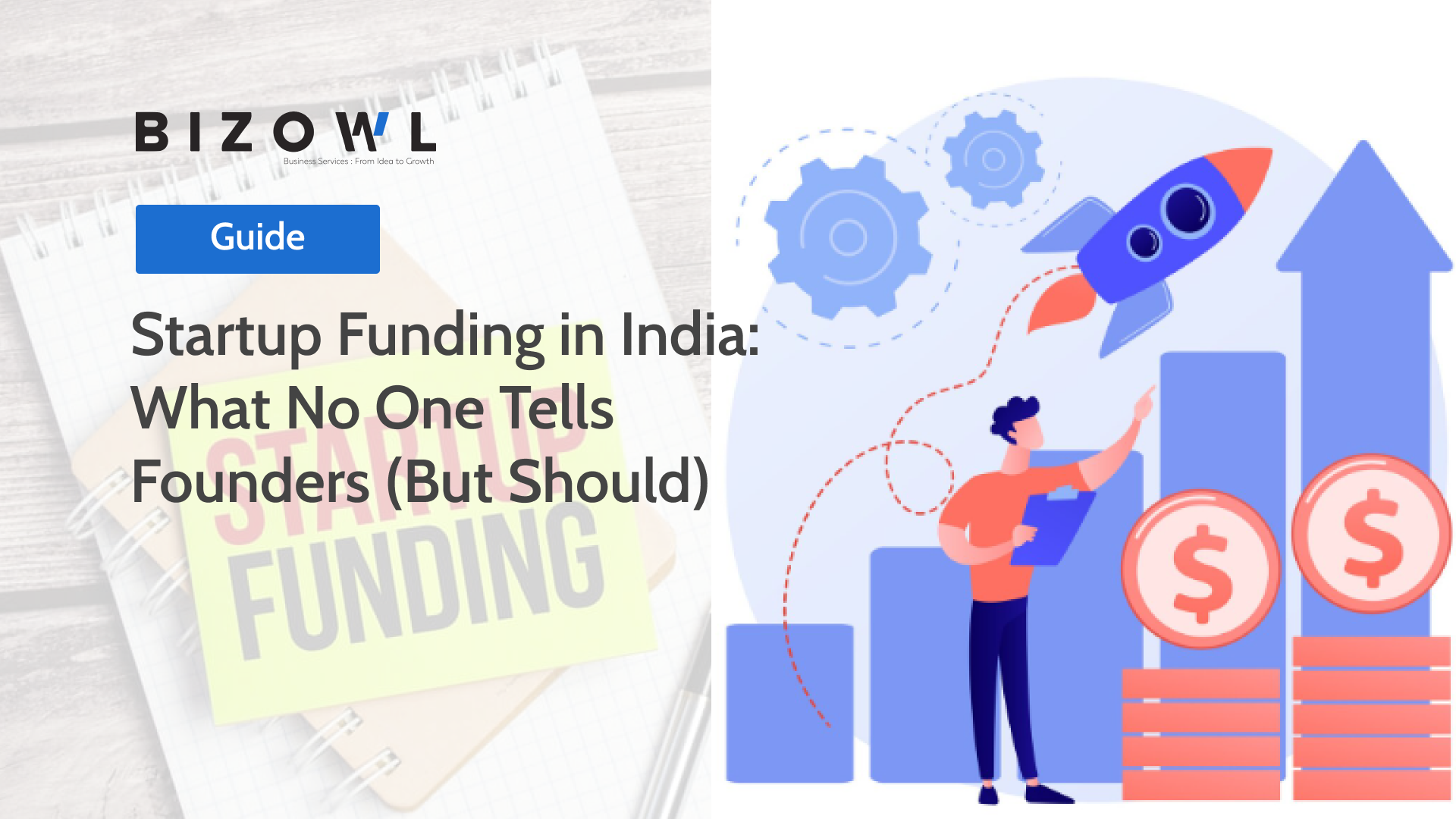
Guide
07-Jul-2025This isn't one of those articles or polished guides. Think of it like a friend sitting next to you, or a founder talking to another founder and trying to guide their fellow entrepreneur. The info is coming from someone who's been through the highs, lows, and confusion of funding in India, just sharing what they've learned, honestly and simply.
Why Indian Startup Funding is Different
Let me tell you something - raising money in India isn't the same as what you see in those Silicon Valley movies. Here, relationships matter more than pitch decks. An intro from the right person can open doors that cold emails never will.
The Indian investor mindset is unique. They've seen global models fail here because they didn't understand local nuances. So when you walk into that meeting, they're not just evaluating your business - they're checking if you really get the Indian market.
Most importantly, Indian investors have longer decision-making cycles. Don't expect to close a round in 30 days like you might in the US. Plan for 3-6 months, sometimes more. It's not inefficiency - it's thoroughness.
The Indian investor mindset is unique. They've seen global models fail here because they didn't understand local nuances. So when you walk into that meeting, they're not just evaluating your business - they're checking if you really get the Indian market.
Most importantly, Indian investors have longer decision-making cycles. Don't expect to close a round in 30 days like you might in the US. Plan for 3-6 months, sometimes more. It's not inefficiency - it's thoroughness.
Free Money First: Government Schemes That Actually Work
Let's start with the best-kept secret - the government is literally throwing money at startups, but most founders don't know how to catch it.
Startup India
Take the Startup India recognition. It's not just a certificate you put on your wall. Once you're recognized, you get three years of tax exemption, fast-track patent filing, and access to government contracts. The process takes about 2-3 weeks if you have your documents ready.
SISFS (Startup India Seed Fund)
Then there's the Seed Fund Scheme - they've earmarked almost ₹1000 crores specifically for early-stage startups. The sweet spot is ₹20 lakhs to ₹5 crores, and unlike VCs, they're okay with slower growth as long as you're solving real problems.
BIRAC (Biotechnology Industry Research Assistance Council)
If you're in biotech or healthtech, BIRAC is your goldmine. They don't just give grants - they help with regulatory approvals, clinical trials, and even international partnerships. I know founders who've raised ₹2-3 crores through BIRAC without giving up a single share.
Atal Innovation Mission: They've got multiple programs - from the ₹1 crore Atal New India Challenge to smaller grants for student startups. The cool part? They're not just giving money, they're building an entire innovation ecosystem.
State-Level Schemes
Each state has its own startup policy too. Karnataka gives you office space, Telangana has T-Hub with amazing facilities, and Gujarat offers land at subsidized rates. The trick is to align your startup with what each state is prioritizing.
Startup India
Take the Startup India recognition. It's not just a certificate you put on your wall. Once you're recognized, you get three years of tax exemption, fast-track patent filing, and access to government contracts. The process takes about 2-3 weeks if you have your documents ready.
SISFS (Startup India Seed Fund)
Then there's the Seed Fund Scheme - they've earmarked almost ₹1000 crores specifically for early-stage startups. The sweet spot is ₹20 lakhs to ₹5 crores, and unlike VCs, they're okay with slower growth as long as you're solving real problems.
BIRAC (Biotechnology Industry Research Assistance Council)
If you're in biotech or healthtech, BIRAC is your goldmine. They don't just give grants - they help with regulatory approvals, clinical trials, and even international partnerships. I know founders who've raised ₹2-3 crores through BIRAC without giving up a single share.
Atal Innovation Mission: They've got multiple programs - from the ₹1 crore Atal New India Challenge to smaller grants for student startups. The cool part? They're not just giving money, they're building an entire innovation ecosystem.
State-Level Schemes
Each state has its own startup policy too. Karnataka gives you office space, Telangana has T-Hub with amazing facilities, and Gujarat offers land at subsidized rates. The trick is to align your startup with what each state is prioritizing.
The Corporate Social Responsibility Game
Here's something most founders miss - CSR isn't charity. It's strategic spending, and smart startups can tap into it.
Every company with ₹500 crores net worth or ₹1000 crores turnover has to spend 2% of their profits on CSR. That's lakhs of crores flowing every year. But here's the catch - they can't just donate randomly. They need a measurable impact.
If your startup is working on education, healthcare, skill development, or rural development, you're in the sweet spot. Companies like Tata, Infosys, and Wipro are actively looking for startups that can deliver a scalable impact.
The smart move? Don't pitch them for funding. Pitch them for a partnership. Show them how your startup can help them achieve their CSR goals more effectively than traditional NGOs. Once they see the value, funding becomes a natural next step.
Real Examples: Tata Trusts has funded startups working on water purification, Infosys Foundation supports ed-tech initiatives, and Bajaj Group has been backing fintech companies serving rural India.
Every company with ₹500 crores net worth or ₹1000 crores turnover has to spend 2% of their profits on CSR. That's lakhs of crores flowing every year. But here's the catch - they can't just donate randomly. They need a measurable impact.
If your startup is working on education, healthcare, skill development, or rural development, you're in the sweet spot. Companies like Tata, Infosys, and Wipro are actively looking for startups that can deliver a scalable impact.
The smart move? Don't pitch them for funding. Pitch them for a partnership. Show them how your startup can help them achieve their CSR goals more effectively than traditional NGOs. Once they see the value, funding becomes a natural next step.
Real Examples: Tata Trusts has funded startups working on water purification, Infosys Foundation supports ed-tech initiatives, and Bajaj Group has been backing fintech companies serving rural India.
Angel Investors: Your First Believers
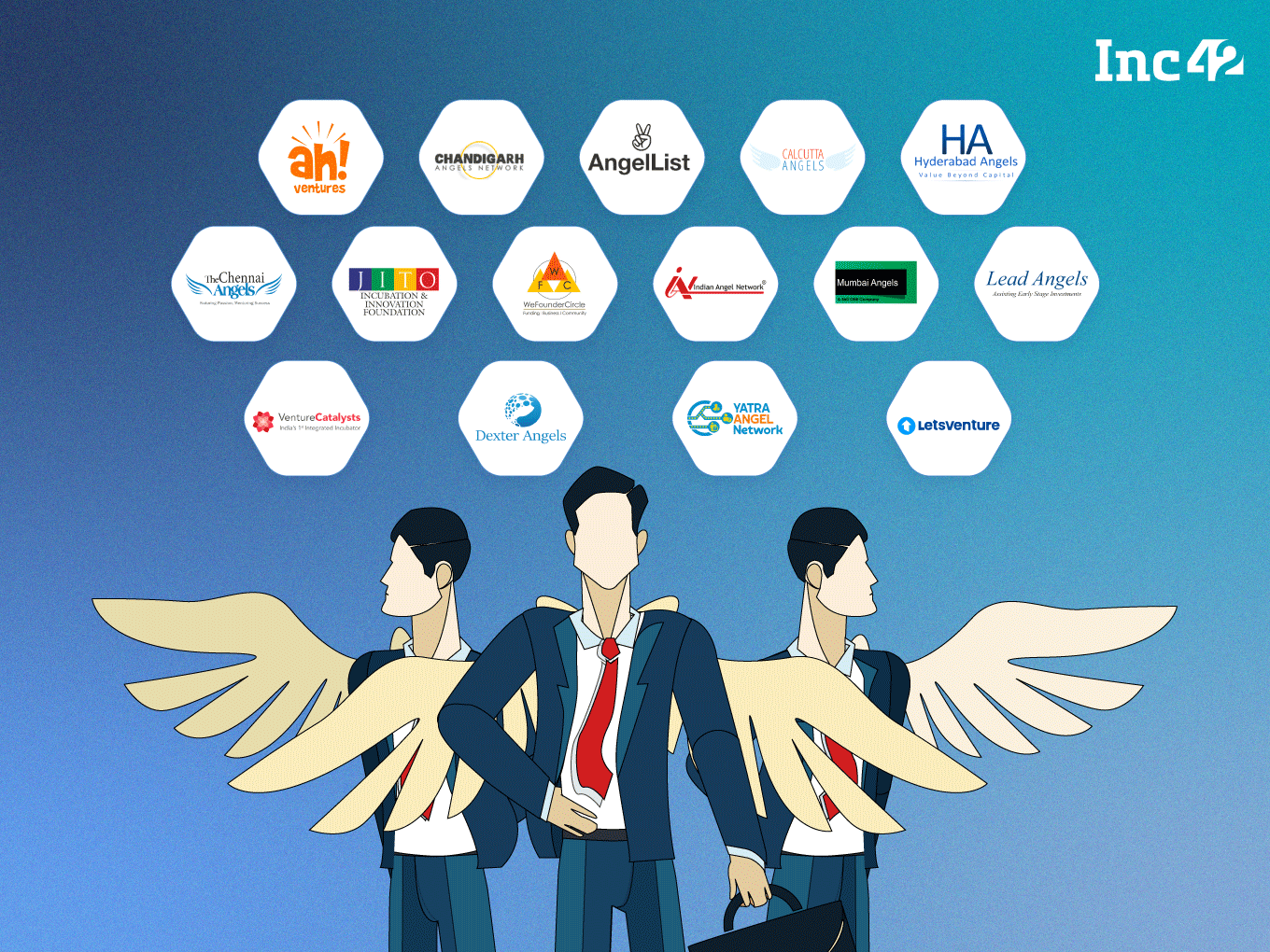
Indian angels are different from global ones. Most of them are entrepreneurs who've built businesses here, so they understand ground realities. They know that customer acquisition costs are different in tier-2 cities, that regulatory compliance takes time, and that building for Bharat requires patience.
The Indian Angel Network has over 450 angels across 10 cities. Mumbai Angels focuses on fintech and consumer tech. Bangalore Angels loves deep tech. Chennai Angels is strong in healthcare and manufacturing.
But here's the insider secret - the best angel deals happen through warm introductions. Join entrepreneur groups, attend startup events, engage on social media. The goal isn't to pitch everyone you meet, but to build relationships that might lead to introductions later.
Angels typically invest ₹10 lakhs to ₹2 crores. The sweet spot is around ₹25-50 lakhs for early-stage startups. They're looking for founders who understand the Indian market, have some early traction, and can articulate a clear path to profitability. They're less interested in hockey stick growth projections and more interested in sustainable business models; here, the bet is placed on the Jockey and not the horse.
The Indian Angel Network has over 450 angels across 10 cities. Mumbai Angels focuses on fintech and consumer tech. Bangalore Angels loves deep tech. Chennai Angels is strong in healthcare and manufacturing.
But here's the insider secret - the best angel deals happen through warm introductions. Join entrepreneur groups, attend startup events, engage on social media. The goal isn't to pitch everyone you meet, but to build relationships that might lead to introductions later.
Angels typically invest ₹10 lakhs to ₹2 crores. The sweet spot is around ₹25-50 lakhs for early-stage startups. They're looking for founders who understand the Indian market, have some early traction, and can articulate a clear path to profitability. They're less interested in hockey stick growth projections and more interested in sustainable business models; here, the bet is placed on the Jockey and not the horse.
Key Angel Networks in India:
Indian Angel Network (IAN): The original pioneer of India's angel investing scene, IAN remains the country's largest platform with over 450 angels spanning 11 countries. Since 2006, they've backed more than 200 startups across diverse sectors from education to robotics. Their impressive portfolio includes success stories like Druva and WebEngage, making them a go-to choice for entrepreneurs seeking seed funding between ₹50 lakhs to ₹50 crores.
Mumbai Angels: Now backed by 360 ONE, Mumbai Angels has deployed over ₹400 crores across 200+ deals. They've built their reputation in fintech and consumer brands, leveraging Mumbai's financial ecosystem. Their strategic focus on urban markets makes them perfect for startups targeting metropolitan consumers and financial services.
Bangalore Angels: Operating from India's tech capital, Bangalore Angels naturally gravitates toward technology startups. They compete with platforms like AngelList and LetsVenture, offering entrepreneurs access to the city's rich tech talent pool and startup ecosystem.
Chennai Angels: This growing network has invested ₹150 crores across 80+ startups, with a sharp focus on deep tech and healthcare. Their investment areas span AgriTech, Electric Vehicles, HealthTech, and Web 3.0. Beyond funding, Chennai Angels members actively mentor portfolio companies, with notable investments including Purplle and Fourth Partner Energy.
Lead Angels - Based in Mumbai, Lead Angels curates early-stage investment opportunities for their network. They focus on seed-stage funding and maintain an active presence in connecting promising ventures with the right investors.
Chandigarh Angels Group - This network targets seed and early-stage investments in AI, FinTech, and healthcare sectors. While based in Chandigarh, they actively invest across major Indian cities including Delhi and Mumbai, offering both capital and mentorship to portfolio companies.
Dexter Angels - A boutique network of 35+ investors, mostly founders and industry veterans. They've backed 13 startups since inception, including consumer brands like TagZ, Flatheads, and HealthySure. Their hands-on approach brings real entrepreneurial experience to their portfolio companies.
Mumbai Angels: Now backed by 360 ONE, Mumbai Angels has deployed over ₹400 crores across 200+ deals. They've built their reputation in fintech and consumer brands, leveraging Mumbai's financial ecosystem. Their strategic focus on urban markets makes them perfect for startups targeting metropolitan consumers and financial services.
Bangalore Angels: Operating from India's tech capital, Bangalore Angels naturally gravitates toward technology startups. They compete with platforms like AngelList and LetsVenture, offering entrepreneurs access to the city's rich tech talent pool and startup ecosystem.
Chennai Angels: This growing network has invested ₹150 crores across 80+ startups, with a sharp focus on deep tech and healthcare. Their investment areas span AgriTech, Electric Vehicles, HealthTech, and Web 3.0. Beyond funding, Chennai Angels members actively mentor portfolio companies, with notable investments including Purplle and Fourth Partner Energy.
Lead Angels - Based in Mumbai, Lead Angels curates early-stage investment opportunities for their network. They focus on seed-stage funding and maintain an active presence in connecting promising ventures with the right investors.
Chandigarh Angels Group - This network targets seed and early-stage investments in AI, FinTech, and healthcare sectors. While based in Chandigarh, they actively invest across major Indian cities including Delhi and Mumbai, offering both capital and mentorship to portfolio companies.
Dexter Angels - A boutique network of 35+ investors, mostly founders and industry veterans. They've backed 13 startups since inception, including consumer brands like TagZ, Flatheads, and HealthySure. Their hands-on approach brings real entrepreneurial experience to their portfolio companies.
Individual Angels to Know About:
Kunal Bahl
Co-founder & CEO of Snapdeal, now runs Titan Capital and AceVector.
A prolific angel, with 150+ early-stage investments across India, SEA, and the US — including Ola, Razorpay, and Urban Company (thestartupboard.com).
Board member at Snapdeal, Unicommerce, Piramal Enterprises, and active in CII and NASSCOM (blog.velocity.in).
Kunal Shah
Founder of FreeCharge and CRED (valued around $6.4 B).
Ranked India's most active angel in 2022 with 54 deals — backing startups like Unacademy, Razorpay, Slice, and Spinny (dataflo.io, livemint.com).
Over 200 angel investments spanning fintech and consumer tech (en.wikipedia.org).
Anupam Mittal
Founded Shaadi.com and People Group, early investor in Ola, BigBasket, Druva, Dunzo, and DocsApp (moneymint.com).
Recognized as a top angel (2014–2015) by Business Standard; over 75 deals per Dataflo (en.wikipedia.org).
Judge on Shark Tank India, bringing capital plus networks, mentoring, credibility (moneymint.com).
Co-founder & CEO of Snapdeal, now runs Titan Capital and AceVector.
A prolific angel, with 150+ early-stage investments across India, SEA, and the US — including Ola, Razorpay, and Urban Company (thestartupboard.com).
Board member at Snapdeal, Unicommerce, Piramal Enterprises, and active in CII and NASSCOM (blog.velocity.in).
Kunal Shah
Founder of FreeCharge and CRED (valued around $6.4 B).
Ranked India's most active angel in 2022 with 54 deals — backing startups like Unacademy, Razorpay, Slice, and Spinny (dataflo.io, livemint.com).
Over 200 angel investments spanning fintech and consumer tech (en.wikipedia.org).
Anupam Mittal
Founded Shaadi.com and People Group, early investor in Ola, BigBasket, Druva, Dunzo, and DocsApp (moneymint.com).
Recognized as a top angel (2014–2015) by Business Standard; over 75 deals per Dataflo (en.wikipedia.org).
Judge on Shark Tank India, bringing capital plus networks, mentoring, credibility (moneymint.com).
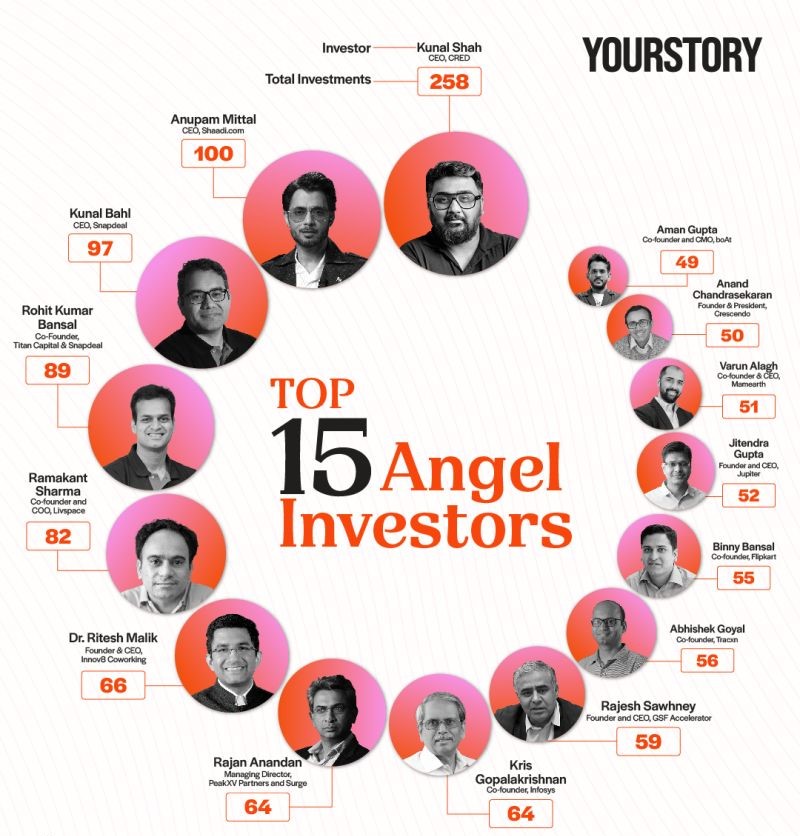
Other Notable Active Angels
Ritesh Agarwal (OYO) — lends investment insight and value beyond capital (thestartupboard.com).
Bhavish Aggarwal (Ola) — active as angel post-Ola success (though specific deal counts are less public).
Rajesh Sawhney (GSF Accelerator) — tech and startup catalyst via angel syndicates.
Sanjay Mehta — founder of 100X.VC, prolific in fintech/SaaS/deep tech early-stage bets (femaleswitch.com).
Rajan Anandan — ex-Google & Microsoft India, over 70 early-stage deals in SaaS, AI, deep tech (dataflo.io).
Lalit Keshre (Groww) — fintech investor with a strong portfolio (thestartupboard.com).
Binny Bansal (Flipkart) — after building Flipkart, leads ~70 investments in tech & consumer startups (dataflo.io).
Rohit Bansal (Snapdeal) — co-founder turned angel with ~60 investments (dataflo.io).
Vijay Shekhar Sharma (Paytm) — has backed ~50 startups, bringing payments and financial tech expertise (dataflo.io).
Bhavish Aggarwal (Ola) — active as angel post-Ola success (though specific deal counts are less public).
Rajesh Sawhney (GSF Accelerator) — tech and startup catalyst via angel syndicates.
Sanjay Mehta — founder of 100X.VC, prolific in fintech/SaaS/deep tech early-stage bets (femaleswitch.com).
Rajan Anandan — ex-Google & Microsoft India, over 70 early-stage deals in SaaS, AI, deep tech (dataflo.io).
Lalit Keshre (Groww) — fintech investor with a strong portfolio (thestartupboard.com).
Binny Bansal (Flipkart) — after building Flipkart, leads ~70 investments in tech & consumer startups (dataflo.io).
Rohit Bansal (Snapdeal) — co-founder turned angel with ~60 investments (dataflo.io).
Vijay Shekhar Sharma (Paytm) — has backed ~50 startups, bringing payments and financial tech expertise (dataflo.io).
The Venture Capital Ladder
Now let's talk about the big leagues. The Indian VC ecosystem has matured incredibly over the last decade. We've got everything from micro VCs writing ₹50 lakh checks to global giants writing ₹1000 crore checks.
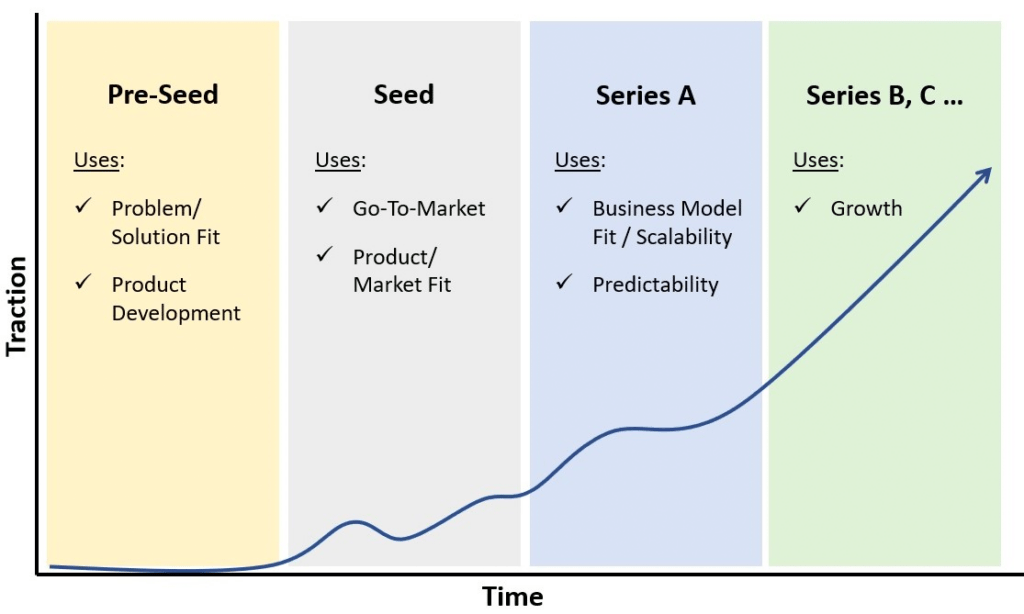
The Pre-Seed Stage (₹10 lakhs - ₹1 crore): You've got an idea, maybe a prototype, and some early validation. Funds like Blume Ventures, 100X.VC, and ah! Ventures are active here. They're betting on your team and the market opportunity you're going after.
Seed Funding (₹1-10 crores): Now you need real traction. Maybe you've got your first 1000 users or generated your first few lakhs in revenue. Programs like Sequoia Surge, Accel Atoms, and Matrix Midas are perfect for this stage. They want to see early signs of product-market fit.
Series A (₹10-50 crores): You've proven your business model works. You're growing consistently, you understand your unit economics, and you're ready to scale. This is where Sequoia Capital, Accel Partners, and Matrix Partners come in. They want to see a clear path to ₹100 crore+ revenue.
Series B (₹50-200 crores): You're scaling across India, maybe expanding to new verticals or geographies. Funds like Tiger Global, SoftBank, and Steadview Capital participate. They're looking for market leadership potential and defensible moats.
Series C and Beyond (₹200+ crores): You're preparing for IPO or international expansion. Late-stage funds like General Atlantic, KKR, and sovereign wealth funds participate. At this stage, you're essentially a proven business looking for growth capital.
Seed Funding (₹1-10 crores): Now you need real traction. Maybe you've got your first 1000 users or generated your first few lakhs in revenue. Programs like Sequoia Surge, Accel Atoms, and Matrix Midas are perfect for this stage. They want to see early signs of product-market fit.
Series A (₹10-50 crores): You've proven your business model works. You're growing consistently, you understand your unit economics, and you're ready to scale. This is where Sequoia Capital, Accel Partners, and Matrix Partners come in. They want to see a clear path to ₹100 crore+ revenue.
Series B (₹50-200 crores): You're scaling across India, maybe expanding to new verticals or geographies. Funds like Tiger Global, SoftBank, and Steadview Capital participate. They're looking for market leadership potential and defensible moats.
Series C and Beyond (₹200+ crores): You're preparing for IPO or international expansion. Late-stage funds like General Atlantic, KKR, and sovereign wealth funds participate. At this stage, you're essentially a proven business looking for growth capital.
Key Indian VCs to Know:
Sequoia Capital: The gold standard. Portfolio includes Zomato, Byju's, Freshworks
Accel Partners: Strong in SaaS and consumer tech
Matrix Partners: Early-stage focused, backed Ola, Razorpay
Lightspeed: Consumer and enterprise-focused
Blume Ventures: Micro VC, very founder-friendly
What's Different About Indian VCs: They understand that customer acquisition costs are different in India, that building for Bharat (smaller cities) requires different strategies, and that regulatory compliance is complex. They're also more patient with profitability timelines compared to global VCs.
Accel Partners: Strong in SaaS and consumer tech
Matrix Partners: Early-stage focused, backed Ola, Razorpay
Lightspeed: Consumer and enterprise-focused
Blume Ventures: Micro VC, very founder-friendly
What's Different About Indian VCs: They understand that customer acquisition costs are different in India, that building for Bharat (smaller cities) requires different strategies, and that regulatory compliance is complex. They're also more patient with profitability timelines compared to global VCs.
Bridge Funding: The Indian Jugaad
Bridge funding is super common in India because fundraising cycles can be unpredictable. Sometimes your Series A discussions are progressing well, but you need 3-6 months more runway to close the round.
How It Works - This usually comes from existing investors - your angels or VCs who want to protect their investment. The ticket sizes range from ₹50 lakhs to ₹5 crores, and it's often structured as convertible notes that convert into your next round.
Indian investors are generally more comfortable with bridge rounds because they understand that things take time here. Regulatory approvals, client cycles, government clearances - everything moves at its own pace.
Pro Tip: Indian investors are generally more comfortable with bridge rounds compared to global investors. They understand that things take time here - regulatory approvals, client cycles, everything moves a bit slower.
Common Scenarios:
- You're 80% done with your Series A, but need more runway
- You've got a big client deal coming in 6 months, but need cash flow now
- You're waiting for a strategic partnership to materialize
- Market conditions are tough, and you need to extend your runway
How It Works - This usually comes from existing investors - your angels or VCs who want to protect their investment. The ticket sizes range from ₹50 lakhs to ₹5 crores, and it's often structured as convertible notes that convert into your next round.
Indian investors are generally more comfortable with bridge rounds because they understand that things take time here. Regulatory approvals, client cycles, government clearances - everything moves at its own pace.
Pro Tip: Indian investors are generally more comfortable with bridge rounds compared to global investors. They understand that things take time here - regulatory approvals, client cycles, everything moves a bit slower.
Common Scenarios:
- You're 80% done with your Series A, but need more runway
- You've got a big client deal coming in 6 months, but need cash flow now
- You're waiting for a strategic partnership to materialize
- Market conditions are tough, and you need to extend your runway
Alternative Funding: Beyond Traditional VC
India has some unique funding options that many founders don't explore:
Revenue-based financing is picking up. Companies like Velocity, GetVantage, and Klub offer capital in exchange for a percentage of your future revenues. It's perfect for profitable startups that don't want to dilute equity.
Crowdfunding platforms like LetsVenture, Wishberry, and Ketto are democratizing startup funding. You can raise smaller amounts from a larger number of people, which also helps with customer validation but when it comes to startups in India, there are very less chances that crowdsourcing is going to work for you.
Corporate venture capital is huge in India. Reliance has GenNext, Tata has Tata Capital, and Mahindra has Mahindra Partners. These aren't just investors - they're potential customers, partners, and mentors.
NBFC lending is also growing. Non-banking financial companies are now funding startups, especially in e-commerce and services. They're faster than banks but more expensive than equity funding.
Revenue-based financing is picking up. Companies like Velocity, GetVantage, and Klub offer capital in exchange for a percentage of your future revenues. It's perfect for profitable startups that don't want to dilute equity.
Crowdfunding platforms like LetsVenture, Wishberry, and Ketto are democratizing startup funding. You can raise smaller amounts from a larger number of people, which also helps with customer validation but when it comes to startups in India, there are very less chances that crowdsourcing is going to work for you.
Corporate venture capital is huge in India. Reliance has GenNext, Tata has Tata Capital, and Mahindra has Mahindra Partners. These aren't just investors - they're potential customers, partners, and mentors.
NBFC lending is also growing. Non-banking financial companies are now funding startups, especially in e-commerce and services. They're faster than banks but more expensive than equity funding.
Bank Funding:
SIDBI: Small Industries Development Bank of India has specific startup schemes
Mudra Loans: For micro enterprises, up to ₹10 lakhs
Stand-Up India: For SC/ST and women entrepreneurs
Mudra Loans: For micro enterprises, up to ₹10 lakhs
Stand-Up India: For SC/ST and women entrepreneurs
Corporate Venture Capital:
Reliance GenNext: Reliance's startup arm
Tata Capital: Tata's investment arm
Mahindra Partners: Mahindra's VC arm
Tata Capital: Tata's investment arm
Mahindra Partners: Mahindra's VC arm
Accelerators with Funding:
Techstars India: Global accelerator with Indian program
Microsoft Accelerator: For B2B startups
Google Launchpad: For tech startups
What's Unique About India: The informal funding network is still strong. Family and friends rounds are common, and there's a growing culture of successful entrepreneurs angel investing. Plus, the government's push for Digital India and Make in India has created sector-specific funding opportunities.
Microsoft Accelerator: For B2B startups
Google Launchpad: For tech startups
What's Unique About India: The informal funding network is still strong. Family and friends rounds are common, and there's a growing culture of successful entrepreneurs angel investing. Plus, the government's push for Digital India and Make in India has created sector-specific funding opportunities.
Intellectual Property: Your Competitive Moat
In India, IP can be your biggest differentiator, especially if you're in deep tech, pharma, or manufacturing. Patents, trademarks, and copyrights aren't just legal protections - they're valuable assets that investors care about.
The good news is that India has improved its IP ecosystem significantly. Patent applications now get processed faster, especially if you have Startup India recognition. The government is also offering subsidized IP services for startups.
If you're in software, your IP might be in algorithms, data sets, or unique processes. If you're in hardware, it could be in design patents or utility models. The key is to identify what makes your startup defensible and protect it legally.
Investors love businesses with strong IP because it creates barriers to entry. But don't fall into the trap of thinking IP alone makes a business. You need IP combined with market traction, a strong team, and clear revenue potential.
The good news is that India has improved its IP ecosystem significantly. Patent applications now get processed faster, especially if you have Startup India recognition. The government is also offering subsidized IP services for startups.
If you're in software, your IP might be in algorithms, data sets, or unique processes. If you're in hardware, it could be in design patents or utility models. The key is to identify what makes your startup defensible and protect it legally.
Investors love businesses with strong IP because it creates barriers to entry. But don't fall into the trap of thinking IP alone makes a business. You need IP combined with market traction, a strong team, and clear revenue potential.
The Funding Process: What Really Happens
Raising money is essentially a sales process where you're selling equity in your company. But in India, it's more relationship-driven than in other markets.
The typical process goes like this: network building, warm introductions, initial meetings, detailed pitches, due diligence, term sheet negotiations, legal documentation, and finally, money in the bank. This can take 3-6 months for smaller rounds and 6-12 months for larger ones.
Due diligence in India is thorough. Investors will check your legal compliance, financial records, team backgrounds, and market positioning. They'll talk to your customers, partners, and sometimes even competitors. Be prepared for this level of scrutiny.
Term sheets in India are getting more founder-friendly, but they still favor investors. Key terms include valuation, liquidation preferences, anti-dilution provisions, and board composition. Get a good lawyer who understands startup deals.
The typical process goes like this: network building, warm introductions, initial meetings, detailed pitches, due diligence, term sheet negotiations, legal documentation, and finally, money in the bank. This can take 3-6 months for smaller rounds and 6-12 months for larger ones.
Due diligence in India is thorough. Investors will check your legal compliance, financial records, team backgrounds, and market positioning. They'll talk to your customers, partners, and sometimes even competitors. Be prepared for this level of scrutiny.
Term sheets in India are getting more founder-friendly, but they still favor investors. Key terms include valuation, liquidation preferences, anti-dilution provisions, and board composition. Get a good lawyer who understands startup deals.
Key Terms Every Founder Should Know
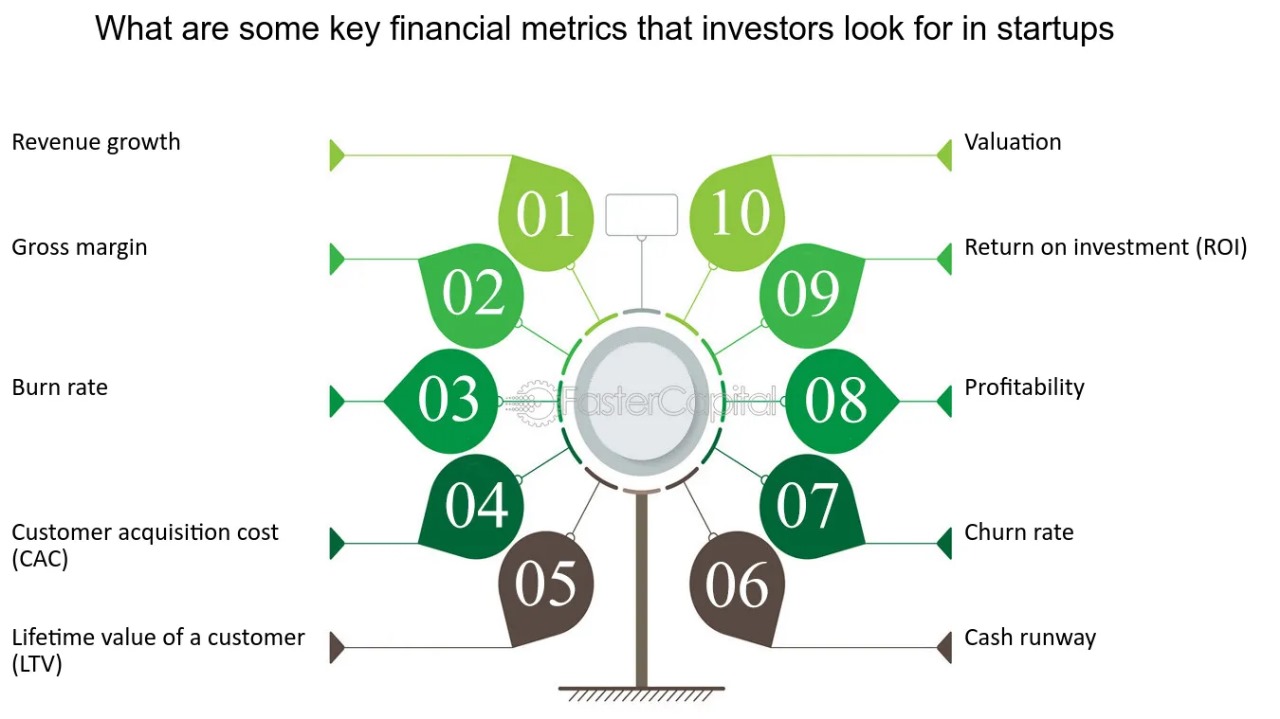
Pre-money and Post-money Valuation: Pre-money is what your company is worth before the investment. Post-money is what it's worth after. If you have a ₹10 crore pre-money valuation and raise ₹5 crores, your post-money valuation is ₹15 crores.
Equity and Dilution: Equity is the percentage of your company you're giving up. Dilution happens when you issue new shares, making existing shareholders' percentages smaller. If you own 100% and raise money by giving up 20%, you now own 80%.
Liquidation Preferences: This determines who gets paid first if your company gets sold or shuts down. Investors often get 1x liquidation preference, meaning they get their money back before founders get anything.
Anti-dilution Provisions: These protect investors if you raise money later at a lower valuation. There are different types - weighted average and full ratchet. Weighted average is more founder-friendly.
Board Seats: Investors often want board seats to have a say in major decisions. Early-stage investors might ask for observer rights instead of full board seats.
Equity and Dilution: Equity is the percentage of your company you're giving up. Dilution happens when you issue new shares, making existing shareholders' percentages smaller. If you own 100% and raise money by giving up 20%, you now own 80%.
Liquidation Preferences: This determines who gets paid first if your company gets sold or shuts down. Investors often get 1x liquidation preference, meaning they get their money back before founders get anything.
Anti-dilution Provisions: These protect investors if you raise money later at a lower valuation. There are different types - weighted average and full ratchet. Weighted average is more founder-friendly.
Board Seats: Investors often want board seats to have a say in major decisions. Early-stage investors might ask for observer rights instead of full board seats.
Practical Tips for Indian Founders
Start building relationships before you need money. The Indian startup ecosystem is relationship-driven. Attend events, join entrepreneur groups, engage on social media. The goal is to be known in the ecosystem before you start fundraising.
Focus on metrics that matter to Indian investors. They care about unit economics, customer acquisition costs, and path to profitability. Growth is important, but sustainable growth is more important.
Understand the regulatory landscape. Indian investors want to see that you understand compliance requirements, taxation, and regulatory risks. This is especially important in sectors like fintech, healthcare, and education.
Be realistic about timelines. Everything takes longer in India - from getting approvals to closing deals. Plan accordingly and don't run out of money while fundraising.
Build for India, not just urban India. The real opportunity is in serving the next 500 million Indians coming online. Investors are looking for startups that can scale beyond metros.
Focus on metrics that matter to Indian investors. They care about unit economics, customer acquisition costs, and path to profitability. Growth is important, but sustainable growth is more important.
Understand the regulatory landscape. Indian investors want to see that you understand compliance requirements, taxation, and regulatory risks. This is especially important in sectors like fintech, healthcare, and education.
Be realistic about timelines. Everything takes longer in India - from getting approvals to closing deals. Plan accordingly and don't run out of money while fundraising.
Build for India, not just urban India. The real opportunity is in serving the next 500 million Indians coming online. Investors are looking for startups that can scale beyond metros.
Conclusion
The Indian startup funding ecosystem is complex but rewarding. It's relationship-driven, process-heavy, and requires patience. But for founders who understand the nuances, there's more capital available today than ever before.
The key is to start with the right type of funding for your stage, build relationships before you need money, and always remember that investors are betting on your team and your understanding of the Indian market.
Most importantly, don't let fundraising become your full-time job. The best way to raise money is to build a great business that investors want to be part of. Focus on your customers, your product, and your team. The funding will follow.
Remember, not every startup needs venture capital. Some of the most successful businesses in India have been bootstrapped or grown with minimal external funding. Choose the path that's right for your business and your goals.
Before you actually go out and try to get funding for the startup, in a bootstrapped business, you have better control over everything.
The key is to start with the right type of funding for your stage, build relationships before you need money, and always remember that investors are betting on your team and your understanding of the Indian market.
Most importantly, don't let fundraising become your full-time job. The best way to raise money is to build a great business that investors want to be part of. Focus on your customers, your product, and your team. The funding will follow.
Remember, not every startup needs venture capital. Some of the most successful businesses in India have been bootstrapped or grown with minimal external funding. Choose the path that's right for your business and your goals.
Before you actually go out and try to get funding for the startup, in a bootstrapped business, you have better control over everything.
Contact Us
Explain Your Project Details
First Name
Last Name
Email
Phone Number
Project Requirements



